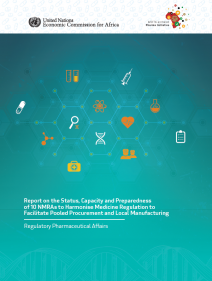Africa is the continent that is the most de pendent on imports for medicines and other health commodities, importing over 97 per cent of what it consumes. Consequently, most African countries experience serious challenges in gaining access to safe, effective, quality-assured medicines and other health commodities to treat both priority and neglected diseases. The African Union and other multilateral organizations have, in the past, adopted initiatives to address these pharmaceutical challenges. These initiatives have had variable and limited success owing to several impediments, especially those related to medicines regulatory policy and capacity. The Pharmaceutical Manufacturing Plan for Africa was adopted by the African Union in 2007 to address these and other related challenges. Fragmented markets and supply chain systems, along with inconsistency in policies across trade, industry, health and finance, are some of the key challenges facing pharmaceutical markets in Africa. The African Continental Free Trade Area-anchored Pharmaceutical Initiative was launched in November 2019 by ECA in collaboration with the African Union Commission, the African Union Development Agency, IGAD and United Nations entities, namely, the Development Coordination Office, UNFPA, UNICEF, UNAIDS and WHO. The Initiative is focused on facilitating and advocating the local production of medicines, pooled procurement, and the employment of a harmonized regulatory and quality framework geared towards strengthening health systems in African countries. The Initiative has facilitated the work of the African Medicines Agency and the implementation of the Agreement Establishing the African Continental Free Trade Area, which creates a single market of 1.3 billion people across the entire continent and a combined GDP of $3.4 trillion. The Initiative has the potential to contribute significantly towards achieving Sustainable Development Goals 3, 9 and 17 and the corresponding aspirations of the Agenda 2063: The Africa We Want, of the African Union.
Share this:
Release Date:
30 October, 2023
© United Nations Economic Commission for Africa

